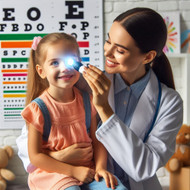Nurturing Bright Futures - Prioritizing Children’s Vision Health this August
Posted by Dr. Sharandeep Takhar MD, MBA on Aug 6th 2024
Why is children’s eye health important right now?
Summer is winding down (yes, we’re calling it early) and that means school is around the corner! At MDD, we are committed to highlighting the importance of healthy vision by recognizing August as Children’s Eye Health and Safety Month.
Undetected Eye disease in early childhood can lead to irreversible vision loss, making it crucial to prioritize our children's eye health. Kids often cannot communicate or recognize vision issues, so it’s vital for caregivers, teachers and healthcare professionals to ensure that their vision remains healthy. As a Family Medicine doctor and sufferer of myopia (don’t know what myopia is? Read on!) Children’s Eye Health is particularly close to my heart.
Vision Screening: When to do it?
It begins at birth! The American Academy of Pediatricians (AAP) recommends screening from infancy and one key instrument in our toolkit is the ophthalmoscope. A staple in any primary care office, ophthalmoscopes are used to check how eyes respond to light and to examine the inner anatomy of the eye.
Starting at age three, we kick off visual acuity assessments. For older kids who can recognize the alphabet, we can use Snellen charts to ensure vision is on track.
Do kids even get eye disease?
Yes! We see a range of conditions affecting kids, such as:
●Myopia (Nearsightedness): Kids can see objects that are close up clearly, but distant objects appear blurry. This is typically corrected with contact lenses or glasses.
●Hyperopia (Farsightedness): The opposite of myopia, where distant vision is clear, but close-up vision is blurry. This is also typically corrected with contact lenses or glasses.
●Cataracts: Not just for adults, cataracts cause the lens of the eye to become cloudy, potentially leading to blindness in kids.
●Retinoblastoma: A rare cancer of the retina.
●And many more!
Do kids see eye doctor specialists?
Absolutely! We refer kids with abnormal vision screening in the primary care setting to ophthalmologists and optometrists for more advanced evaluation. During these visits, instruments like MDD’s vision screeners (see here and here for examples) are used as part of a comprehensive vision assessment.
Further Resources:
●The National Eye Institute has great tips on educating our kids about their eye health
●Nationalblindness.org offers a helpful list of signs to watch out for in kids that may warrant medical evaluation
●Proactive tips to keep our kids’ vision healthy by Optometrists.org
We’d love to hear from you! Connect with us on social media - like and follow our page for updates

